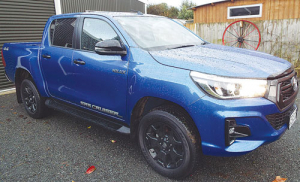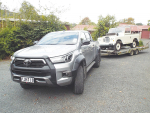The nebula blue ute parked on the drive looks the part, but is it up to the undertaking the rigours of a week in cow-country Waikato?
The answer of course is ‘yes’.This is a Hilux, bred for this type of life, not for kerb climbing or puddle jumping.
This example, one of 33 in the range, is the flagship SR5 Cruiser-Double Cab that replaces the outgoing SR5 Limited.
Styled to look a tad more aggressive, the Cruiser can also be bought as a 2WD Pre-Runner, so city folk are still catered for.
Meanwhile the ‘hardened’ look is done in Kiwi style – a black hexagonal grille, a revised bumper, 18-inch black alloys, black door mirrors and handles, a black rear bumper and Cruiser decals.
Powered by the well-known 1GD-FTV, 2.8L turbo diesel pushing out 130kw and 450Nm torque, the cruiser is no rocketship but it gets the job done. It has a choice of ECO or power modes, with the latter sharpening up the throttle response and making progress quicker.
The peach in the package is its 6-speed automatic transmission that is silky smooth and changes ratios without hesitation, and you get little perception that anything is happening.
Add to this a rotary switch for a choice of 2WD-High, 4WD-High and 4WD-Low drive modes, plus a locking rear diff, then all terrain is easy to traverse.
In the cabin, the perforated black upholstery has plush leather accents, and butts are kept toasty in the front by seat heaters.
The seating position is firm and supportive, and a commanding driving position and good visibility are easy to achieve with plenty of seat adjustment and a tilt-and-telescope steering column.
A new instrument cluster has new tacho and speedo dials, and a new welcome display when the start button is pushed.
Standard equipment comes in a vast list: seven airbags, satnav, LED headlights, daytime running lights and spotlights, climate air conditioning and a useful rear-view camera to cover parking and hitching up with ease.
On the road the vehicle is quiet and refined, with little noise or vibration, no doubt because of the re-worked real leaf spring suspension. Driving throws up no surprises. Nicely weighted steering keeps you heading in the direction you intended, and if you do hit the gas in the twisty stuff everything stays under control.
A comprehensive safety package is built into this work-hard /play-hard vehicle: stability control, traction control and ABS speak for themselves, and electronic brake force distribution, brake assist, hill start and descent, and trailer sway control functions all play their part.
What’s not to like? Perhaps the integration of the touch screen display; that looks an afterthought, but that’s a minor grumble when the real question should be ‘would you buy one?’ The response is likely to be ‘why wouldn’t you? given that the Toyota driveaway price is about $57,000, much better value than the other brand’s flagships.


















